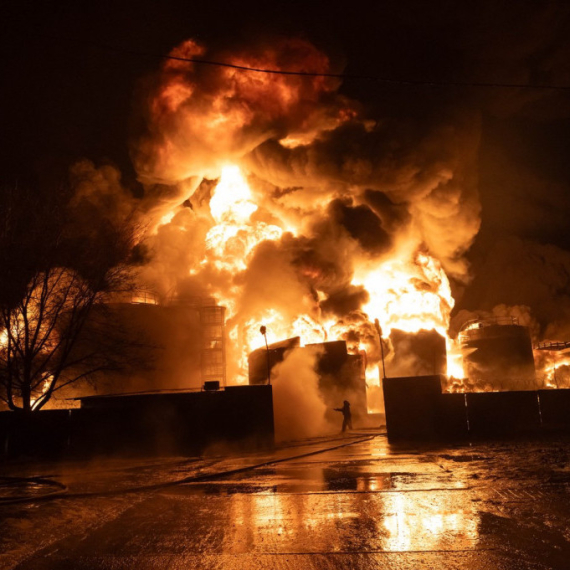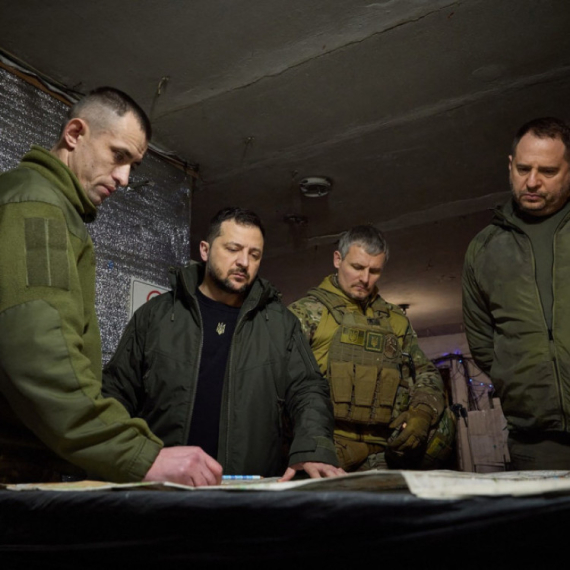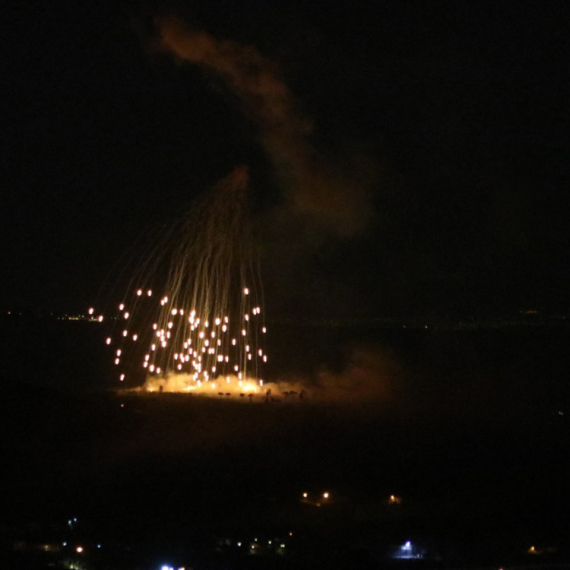Army chief wants KFOR reaction to ANA
Lt. Gen. Zdravko Ponoš has today in Brussels asked NATO to take necessary measures over a Kosovo Albanian terror group.
Wednesday, 14.11.2007.
13:27

Lt. Gen. Zdravko Ponos has today in Brussels asked NATO to take necessary measures over a Kosovo Albanian terror group. The Serbian Army chief of staff was at the NATO HQs for meetings with top alliance officials when he urged a Euro-Atlantic Partnership Military Committee session to undertake steps and prevent extremist activity in Kosovo. Army chief wants KFOR reaction to ANA His statement came a day after a number of media reports indicated that the Albanian National Army (ANA), as of 2003 designated terrorist by the UN administration in the province, was active and recruiting new members. Ponos told Beta news agency that he expected NATO to react and prevent the group from bringing a feeling of insecurity to the Serb population in Kosovo. The top Serbian general's interlocutors included chair of the NATO Military Committee, Canadian General Ray Henault, and Italy's chief of staff, Admiral Giampaolo Di Paola. They told Ponos that KFOR was satisfied with cooperation with the Serbian Army, and assured him the peacekeepers were ready to provide security for all residents of the province. Earlier, the Forum for Security and Democracy NGO called for a Serbia-NATO meeting following emergence of the ethnic Albanian paramilitary group. The Forum said that Serbia, as a member of the Partnership for Peace, has every right and obligation to ask for an urgent meeting with the NATO secretary-general following the most recent information concerning the existence of Albanian paramilitary formations in Kosovo. “Such an approach would be much more effective for Serbia, than political comments and statements that only go to spread fear both throughout Kosovo and Serbia itself,“ reads the statement. The Forum concludes that KFOR and NATO “are obliged to take measures at their disposal to counter and eliminate threats posed to both the security situation in Kosovo, and the regular resumption of the negotiating process.“ Also Wednesday, spokesmen for the Kosovo Police Service (KPS) and KFOR told a news conference in Pristina that the two forces "control the entire territory of Kosovo" and consider "organizations such as ANA illegal." They added that an investigation into the resurfacing of ANA was ongoing, but that "at this stage no information was available to the media." KFOR has enough troops on the ground to provide security in Kosovo, a spokesman for the peacekeepers said, and added that contingency plans for extra troop deployment also existed, but downplayed the possibility that they may be needed. KFOR currently has some 16,000 soldiers in Kosovo. Meantime, a professor at Kent University’s Faculty of Political Science, Florian Bieber, said that although the Albanian National Army paramilitary formation might not currently be a threat, it could turn into a serious problem, depending on the outcome of the Kosovo talks. The situation Kosovo finds itself in needs to be fully understood, as there are quite a few scenarios whereby some sort of conflict could be forecast in December or January, Bieber told the BBC. “In the event of a unilateral declaration of independence, the big question is what will happen in the north of Kosovo, around Kosovska Mitrovica, and if an unofficial partition of Kosovo takes place, what will happen to the Serb-populated enclave in the south?" "In the event of a further postponement, there will be pressure from extremists in Kosovo to do something,“ he said, adding that the situation also had to be considered from the point of view of the November 17 provincial elections. Ponos, middle, with Russian and Slovak counterparts at NATO HQs (Tanjug)
Army chief wants KFOR reaction to ANA
His statement came a day after a number of media reports indicated that the Albanian National Army (ANA), as of 2003 designated terrorist by the UN administration in the province, was active and recruiting new members.Ponoš told Beta news agency that he expected NATO to react and prevent the group from bringing a feeling of insecurity to the Serb population in Kosovo.
The top Serbian general's interlocutors included chair of the NATO Military Committee, Canadian General Ray Henault, and Italy's chief of staff, Admiral Giampaolo Di Paola.
They told Ponoš that KFOR was satisfied with cooperation with the Serbian Army, and assured him the peacekeepers were ready to provide security for all residents of the province.
Earlier, the Forum for Security and Democracy NGO called for a Serbia-NATO meeting following emergence of the ethnic Albanian paramilitary group.
The Forum said that Serbia, as a member of the Partnership for Peace, has every right and obligation to ask for an urgent meeting with the NATO secretary-general following the most recent information concerning the existence of Albanian paramilitary formations in Kosovo.
“Such an approach would be much more effective for Serbia, than political comments and statements that only go to spread fear both throughout Kosovo and Serbia itself,“ reads the statement.
The Forum concludes that KFOR and NATO “are obliged to take measures at their disposal to counter and eliminate threats posed to both the security situation in Kosovo, and the regular resumption of the negotiating process.“
Also Wednesday, spokesmen for the Kosovo Police Service (KPS) and KFOR told a news conference in Priština that the two forces "control the entire territory of Kosovo" and consider "organizations such as ANA illegal."
They added that an investigation into the resurfacing of ANA was ongoing, but that "at this stage no information was available to the media."
KFOR has enough troops on the ground to provide security in Kosovo, a spokesman for the peacekeepers said, and added that contingency plans for extra troop deployment also existed, but downplayed the possibility that they may be needed.
KFOR currently has some 16,000 soldiers in Kosovo.
Meantime, a professor at Kent University’s Faculty of Political Science, Florian Bieber, said that although the Albanian National Army paramilitary formation might not currently be a threat, it could turn into a serious problem, depending on the outcome of the Kosovo talks.
The situation Kosovo finds itself in needs to be fully understood, as there are quite a few scenarios whereby some sort of conflict could be forecast in December or January, Bieber told the BBC.
“In the event of a unilateral declaration of independence, the big question is what will happen in the north of Kosovo, around Kosovska Mitrovica, and if an unofficial partition of Kosovo takes place, what will happen to the Serb-populated enclave in the south?"
"In the event of a further postponement, there will be pressure from extremists in Kosovo to do something,“ he said, adding that the situation also had to be considered from the point of view of the November 17 provincial elections.



























































Komentari 16
Pogledaj komentare